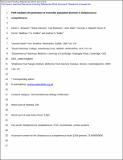PinR mediates the generation of reversible population diversity in Streptococcus zooepidemicus
Abstract
Opportunistic pathogens must adapt to and survive in a wide range of complex ecosystems. Streptococcus zooepidemicus is an opportunistic pathogen of horses and many other animals, including man. The assembly of different surface architecture phenotypes from one genotype is likely to be crucial to the successful exploitation of such an opportunistic lifestyle. Construction of a series of mutants revealed that a serine recombinase, PinR, inverts 114 bp of the promoter of SZO_08560, which is bordered by GTAGACTTTA and TAAAGTCTAC inverted repeats. Inversion acts as a switch, controlling the transcription of this sortase-processed protein, which may enhance the attachment of S. zooepidemicus to equine trachea. The genome of a recently sequenced strain of S. zooepidemicus, strain 2329 (Sz2329), was found to contain a disruptive internal inversion of 7 kb of the FimIV pilus locus, which is bordered by TAGAAA and TTTCTA inverted repeats. This strain lacks pinR and we hypothesized that this inversion may have become irreversible following the loss of this recombinase. Active inversion of FimIV was detected in three strains of S. zooepidemicus: 1770 (Sz1770), B260863 (SzB260863) and H050840501 (SzH050840501), all of which encoded pinR. A deletion mutant of Sz1770 that lacked pinR was no longer capable of inverting its internal region of FimIV. Our data highlight redundancy in the PinR sequence recognition motif around a short TAGA consensus and suggest that PinR can reversibly influence the wider surface architecture of S. zooepidemicus, providing this organism with a bet-hedging solution to survival in fluctuating environments.
Citation
Steward , K F , Harrison , T , Robinson , C , Slater , J , Maskell , D J , Harris , S R , Holden , M T G & Waller , A S 2015 , ' PinR mediates the generation of reversible population diversity in Streptococcus zooepidemicus ' , Microbiology , vol. 161 , no. 5 , pp. 1105-1112 . https://doi.org/10.1099/mic.0.000057
Publication
Microbiology
Status
Peer reviewed
ISSN
1350-0872Type
Journal article
Description
This project was funded by a project grant from the Horserace Betting Levy Board (vet/prj/751).Collections
Items in the St Andrews Research Repository are protected by copyright, with all rights reserved, unless otherwise indicated.

